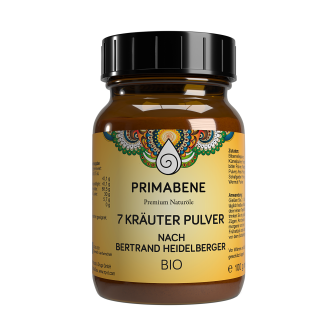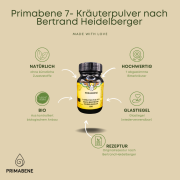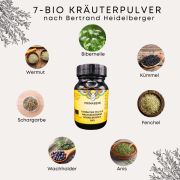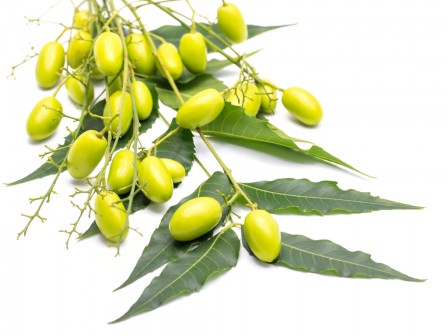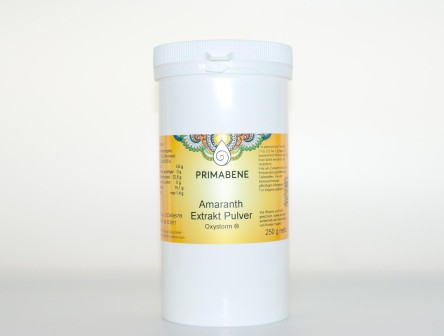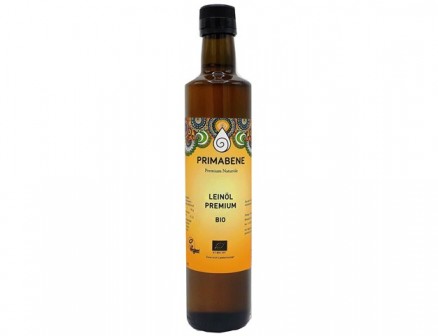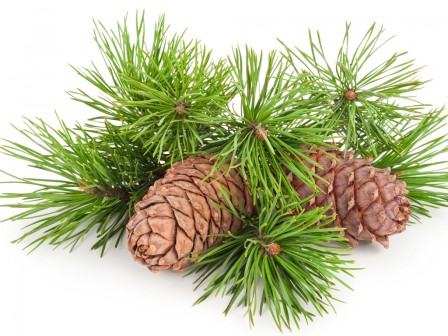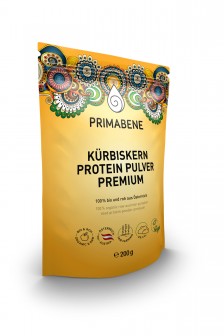product description
BIO 7 herbs powder according to Bertrand Heidelberger
- Vegetable bitter substances
- 7 different herbs
- Controlled organic cultivation
- Vegan
The history of the 7 herbal powder goes back to Bertrand Heidelberger. Each one of the seven herbs and above all the intensive interaction of the various bitter substances can have a beneficial effect on the organism.
Ingredients:
- Wormwood (Artemisia absinthium) True wormwood (Artemisia absinthum), also known as common wormwood or wormwood herb, belongs to the mugwort family. It originally comes from Siberia, parts of Asia, Morocco and Algeria. Today, wormwood is widespread and can also be found in Europe. Wormwood contains a high concentration of various bitter substances. Sometimes the leaves have an effective essential oil - absinthol. There is also the bitter glycoside absinthine and other valuable substances. Because of the greenish color and bitter taste, they resemble bile and bilirubin. In addition, wormwood scores with a lot of potassium, manganese, malic and tannic acid, as well as succinic acid, resin, vitamins C and B2.
- Yarrow (Achillea millefolium) The plant belongs to the daisy family and is very species-rich. Today it can be found almost everywhere in the world and is cultivated in many countries. The plant has essential oils (chamazulene), the bitter substance achillein, coumarins, flavonoids, tannins, resins, inulin, potassium, copper, vitamin C and protein. The chlorophyll contains a substance similar to vitamin A.
- Fennel (Foeniculum vulgare) is one of the oldest medicinal and spice plants. Fennel belongs to the umbelliferae family. Fennel originally comes from the Mediterranean region, where it can still be found wild to this day. Fennel seeds have 4% essential oils, which contain approx. 60% anethole, fenchone, estragole and flavonoids.
- Caraway (Carum carvi) is an ancient cultivated plant native to Eurasia and can be found in wet meadows, along banks, in pastures and grassy areas. Cumin also often grows wild. In addition to fiber and proteins, caraway contains important omega-3 and omega-6 fatty acids as well as flavonoids with an antioxidant effect. These include carotene, lutein, cryptoxanthin, and zeaxanthin. The essential oils limonene, carvone, carveol, cumuninicaldehyde and furfurol are particularly important.
- Burnet burnet (Pimpinella saxifraga) is found in Europe, the Caucasus and North America. Their preferred locations are river banks, light-colored forests and wild meadows with nutrient-rich or loamy soil. Important components of this plant are essential oil, tannins, coumarin, resins, bitter substances, saponins, pimpinellin and furocoumarin.
- Aniseed (Pimpinella anisum) is well known as a household remedy, smells sweet of fennel and the fruits contain up to 98% Atenhol, this ingredient forms the basis for the versatile uses of aniseed.
- Juniper: The most important pharmacologist of antiquity, Dioscurides, mentions juniper in his writings. The Latin name of the cypress plant Juniperus means "berries of Juno".
Nutritional information per 100g
Calorific value:328 kcal / 1.362 kJ
Fat: 11,2 g
Carbohydrates: 26,7 g
of which sugar: 8,9 g
Fiber: 35,3 g
Protein: 11,6 g
Salt: 0,2 f
Application:
Pour hot water over a teaspoon 2 - 3 times a day and drink in gulps. Best in the morning before breakfast and in the evening before going to bed.
Reviews



